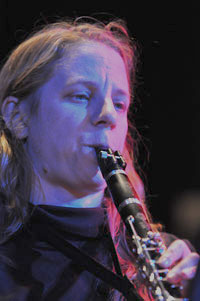Jeri Sykes
Position
Professor
Affiliated Departments
Telephone
617-747-8670
For media inquiries, please contact Media Relations
Career Highlights
- Reed player: flutes, clarinets, saxophones, and oboe
- Performer in musical theater, jazz bands, and classical ensembles
- Arranger and performer for the bands Lawsuit, and Preoccupied Pipers
- Recordings include Emergency Third Rail Power Trip (1995), Jokes About the Medical Profession (2003), and The Trout Supershow (2006)
- Composition, lighting, and sound designer for theater
- Private teacher of woodwind instruments; faculty member, Brookline Music School
Education
-
School NameBerklee College of MusicState or ProvinceMassachusettsDegreeBachelor of Music (BM)Field of StudyContemporary Writing & ProductionDate Degree Received
-
School NameUniversity of California-DavisState or ProvinceCaliforniaDegreeMaster of Fine Arts (MFA)Field of StudyTheatreDate Degree Received
-
School NameUniversity of California-Santa BarbaraState or ProvinceCaliforniaDegreeBachelor of Fine Arts (BFA)Field of StudyTheatreDate Degree Received
In Their Own Words

